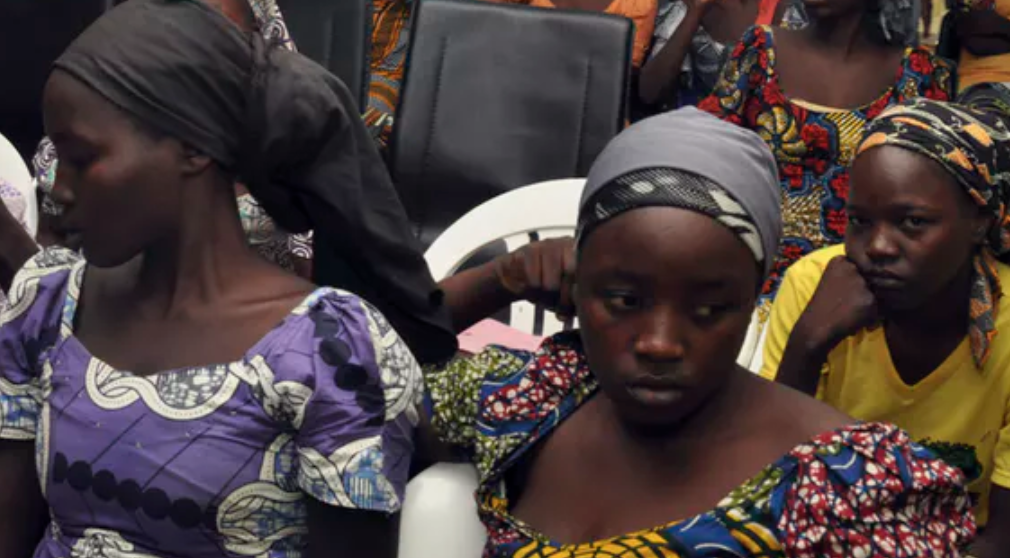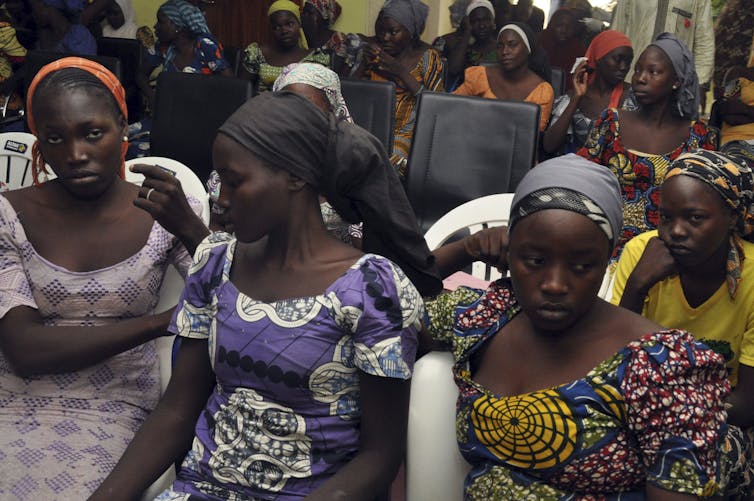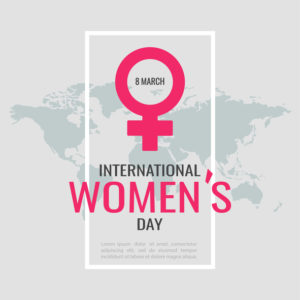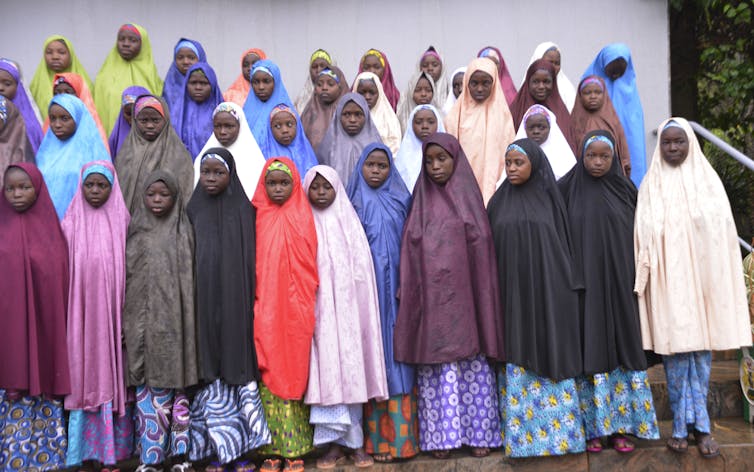
Once captives of Boko Haram, Four former Chibok schoolgirls find new purpose in PA

Olamikan Gbemiga/AP
 Of all the challenges faced by people who’ve been displaced, perhaps none is more important than to find new meaning in their lives. And so it is with the four young women who are students in a college prep class that I teach at Dickinson College.
Of all the challenges faced by people who’ve been displaced, perhaps none is more important than to find new meaning in their lives. And so it is with the four young women who are students in a college prep class that I teach at Dickinson College.
All four students were among the more than 200 Chibok schoolgirls who were abducted by Boko Haram in April 2014. The kidnapping triggered international outrage and prompted the worldwide #BringBackOurGirls campaign.
As we approach the five-year anniversary of the kidnapping of the Chibok schoolgirls – many of whom are still being held captive – it is worth taking a look at what the world has done to help those who have survived the ordeal. The Nigerian government has secured the release of less than half of the kidnapped schoolgirls, with at least 100 still being held captive.
The class I teach at Dickinson offers a small glimpse into the kidnapped Chibok schoolgirls’ lives. It is an outcome that their captors in Boko Haram – a terrorist group whose name means “Western education is forbidden” – never wanted to imagine.
Over the past year or so, the four students I teach have worked hard to achieve their dream of obtaining a high school equivalency diploma so they can have a shot at college. They have attempted the GED practice test and real tests quite a few times.
Assessors said it would take about five to seven years to get them ready for college. However, something took place in February that leads me to believe it won’t take that long. But before I tell that story, a little background is in order.
Escaping captivity
While the Chibok school kidnapping is widely associated with the #BringBackOurGirls campaign, fortunately, my students never had to be “brought back.” That’s because they were among the lucky ones who escaped from the insurgent group as they were being taken to the Sambisa Forest in Nigeria.

Sunday Alamba/AP
How the four young women came to be my students at a small, historic, private liberal arts college in Pennsylvania is a long and complicated story. Not all of it has been pleasant. The Wall Street Journal told much of their rough ordeal in the United States in 2018.
That same year, Dickinson College president Margee Ensign was asked and agreed to welcome the young women to our campus. She had done the same a few years earlier with some of the kidnapped Chibok schoolgirls when she was head of the American University of Nigeria, where I also used to teach.
The students are all on full scholarship funded by the Nigerian government’s Victim Support Fund and the Murtala Mohammed Foundation.
Journey to the United States
I came to Dickinson College in the fall of 2017 as a visiting professor in international studies. I first met the four former Chibok schoolgirls in April 2018, when Dickinson launched the College Bridge program in which they are now enrolled.
Through the program, the young women take a college prep class with me that focuses on critical and analytical thinking skills. They also take math, English, science, social studies and GED preparatory classes.
A global mission, challenging work
In many ways, the bridge program at Dickinson is in line with UNESCO’s new #RightToEducation campaign that is meant to expand access to higher education for refugees. According to the United Nations High Commission for Refugees, among the world’s 16.1 million refugees, only 1 percent of college-aged refugees attend university, compared to 34 percent of all college-aged youth globally.

Azeez Akunleyan/AP
The work of preparing students with refugee backgrounds for college is far from easy. Aside from adjusting to a new culture and environment, sometimes a new language and a different method of learning, displaced persons struggle to find new meanings in their displacement. When education becomes their main pursuit, it must necessarily provide those new meanings.
A breakthrough
For a student named Patience, new meaning has been found in her quest to become a schoolteacher or counselor. Patience has taken a significant step toward that goal. It came to light when she showed up over an hour late to my class one day in February.
“What happened today?” I asked when she walked in, trying to keep my voice and expression from revealing my disappointment.
“I went to take my GED Math this morning. I told you,” she said.
I’m not sure how I forgot that she was going to take the GED Math, but I did. Had I remembered, I would have sent her one of my motivational texts to get her inspired. This was her third attempt on the GED.
“How did it go?” I asked.
“It went well,” she answered, her voice flat, face emotionless.
“So …” I stammered, “did you pass?”
“Yes, I did,” she said, and then told me her score. The whole class erupted in cheers and claps. I was so excited, I rushed and hugged her without thinking. The other students joined. It was one of the most rewarding moments in my decade of teaching. A few weeks later, Patience passed her GED Science exam as well.
Inspiring others
Patience is the first among the four women to pass a GED test. In order to appreciate what a big deal this is, consider where these young women have come from.
Beyond having had a tumultuous life, the students come from an unimaginably poor educational background. The Government Girls Secondary School they attended in Chibok, Borno state, is in a very remote part of Nigeria. You normally wouldn’t have good teachers in such remote areas. But with the Boko Haram insurgency that has plagued the region for the past decade, the situation is far worse. The insurgency has prompted most of the good teachers to leave. According to Human Rights Watch, at least 611 teachers have been deliberately killed by the insurgents since 2009, forcing a further 19,000 teachers to flee. The students have told me that their school at Chibok did not have qualified science, math or language teachers. Their science labs had no equipment.
The Borno state Ministry of Education and many other states in northern Nigeria generally do not prioritize education for girls due to religion and culture, which both support early marriage. In Borno state, the attendance rate for female secondary school students is 29 percent, compared with a national average of 53 percent. So this is a huge achievement for Patience and the other women in their journey toward college. When they eventually get into college, I believe it will inspire thousands of other young girls from that region of the world.
For her part, Patience hopes to inspire girls worldwide.
I know this because in early 2019, I worked with Patience and her fellow students on listening and comprehension skills. For one exercise, I had them watch and then write their opinion about this inspiring talk by Mary Maker, a former South Sudanese refugee who is now a teacher at a school in Kenya’s Kakuma Refugee Camp, on the power of education for women from crises societies.
Patience and the others could relate very easily with the speech and with the speaker. It spoke to their past and their present, their hopes and aspirations. The proof is that in her essay about the video, Patience wrote that she wants to have a voice like Mary Maker’s – and to speak for women who cannot speak for themselves.![]()
Jacob Udo-Udo Jacob, Visiting International Scholar in International Studies & Political Science, Dickinson College
This article is republished from The Conversation under a Creative Commons license. Read the original article.
